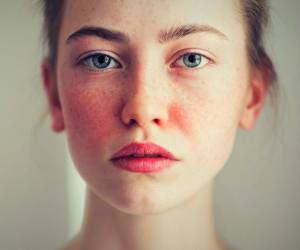Rosacea (Facial Redness) Disease
Rosacea (Facial Redness) Disease
Book Now
Rosacea (Facial Redness) Disease
Rosacea is a chronic skin condition that primarily affects the central part of the face, including the nose, chin, forehead, and cheeks. It starts with redness and burning episodes, which later progress to pimples, persistent redness, increased blood vessels, and swelling, giving the skin a puffy appearance. Rosacea is also known as "the flush disease" or "rosy skin."
Causes of Rosacea
The exact cause of rosacea is unknown, but several factors have been implicated:
-
Genetic Predisposition: A family history of rosacea increases the likelihood of developing the condition.
-
Infectious Causes: The most commonly suspected infectious agents are Helicobacter pylori bacteria found in the stomach and Demodex mites that inhabit the skin on the face.
-
Environmental Factors: Environmental elements such as ultraviolet (UV) light and temperature fluctuations play a role in the onset and flare-ups of rosacea lesions.
-
Psychological Factors: Burning and redness episodes, particularly when intermittent, may be influenced by mood changes and psychological stress.
-
Immune System Dysregulation: Recent studies suggest that imbalances in the skin's natural defense system may contribute to the development of rosacea.
Factors That Can Exacerbate Rosacea
-
Foods and Beverages: Hot or cold drinks, foods like soups, tea, coffee, spicy foods, hot peppers, pickles, chocolate, and alcohol can trigger or worsen rosacea symptoms.
-
Weather Conditions: Exposure to sunlight, hot or cold weather, humidity, and wind can all worsen the condition.
-
Psychological Stress and Excessive Exercise: Emotional stress and strenuous physical activity can lead to flare-ups of rosacea.
-
Bathing, Cleaning, and Personal Care Products: Hot baths and skin-irritating products such as colognes, toners, rosewater, and wet wipes may aggravate rosacea.
-
Medications: Long-term use of topical corticosteroids on the face can contribute to the development or worsening of rosacea.
-
Systemic Conditions: Hormonal changes such as those occurring before menstruation, during pregnancy, or menopause, as well as severe coughing or constipation, may exacerbate rosacea.
How is Rosacea Treated?
The most effective, comfortable, and reliable treatment for rosacea is BBL (BroadBand Light) laser therapy.
BBL Laser treatment is a painless, non-invasive, and needle-free method that significantly helps to control rosacea. While a complete cure is challenging, the condition can be managed effectively with proper treatment.
General Measures
-
Avoid triggers: The most important step is to stay away from factors that worsen the symptoms of rosacea.
-
Sun Protection: One of the primary triggers for rosacea is sun exposure. It is essential to use a suitable sunscreen recommended by your dermatologist every 2-4 hours, especially during periods of high sun intensity. Avoid direct sunlight during peak hours.
Topical Treatment
For mild cases, creams and gels are often used. The most commonly prescribed medications include:
- Metronidazole (cream, gel, lotion)
- Azelaic acid (cream, gel)
- Sodium sulfacetamide, Sulfacetamide + Sulfur
Other topical treatments include tretinoin, benzoyl peroxide, erythromycin, clindamycin, tetracycline, 5% permethrin cream, tacrolimus, and pimecrolimus.
Systemic Treatment
For severe cases, systemic treatment may be used alone or in combination with topical agents. The most commonly prescribed systemic medications are antibiotics such as minocycline, doxycycline, tetracycline, metronidazole, and azithromycin, as well as vitamin A derivatives such as isotretinoin.
Is There a Special Diet for Rosacea?
There is no specific diet for rosacea, but it is advisable to avoid foods and beverages that can exacerbate facial redness. Additionally, it is important to avoid smoking and the use of tobacco products, as they may also contribute to flare-ups.
In conclusion, although there is no definitive cure for rosacea, proper treatment can effectively control the condition and prevent flare-ups.
Make an Appointment
The best way to enjoy a treatment at our salon is to book an appointment with the desired esthetician. Fill in the form below and we will contact you to discuss your appointment.